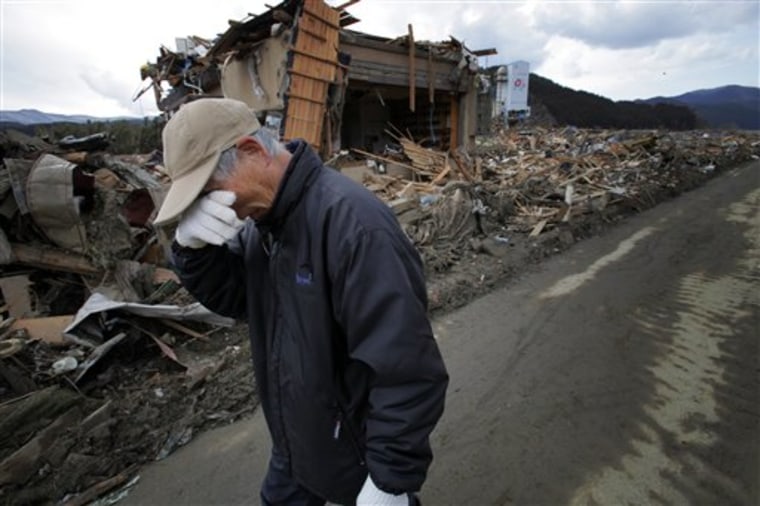In Japan's disaster, the elderly have borne the brunt of the calamity.
This became more and more clear as shocking and heartbreaking stories emerged on Friday from a nation hit hard by disaster and despair. Among the accounts:
- More than 125 elderly Japanese patients, many comatose, were abandoned by medical staff at a hospital six miles from the damaged Fukushima nuclear plant, The Guardian reported. At least 14 subsequently died.
- At least 11 men and women perished inside a retirement home in Kesennuma, where for six days they faced freezing temperatures, according to the Guardian.
- Fourteen senior citizens died after being moved to a temporary shelter in a school gym because their hospital was in the evacuation zone near the damaged Fukushima nuclear power plant, The Associated Press reported.
"We feel very helpless and very sorry for them," said Chuei Inamura, a Fukushima government official.
As retrieving bodies increasingly becomes the focus of rescue crews in Japan's northeast, it's clear that last Friday's quake and tsunami — believed to have killed 10,000 — took their heaviest toll on the elderly in this fast-aging nation, where nearly one person in four is over 65.
Many, unable to flee fast enough, perished. Survivors have lost medicines. Hospitals have lost power and water. Sometimes, the consequences have been fatal.
'No hope'
"I think there is no hope," said Katsuo Maiya, who for a week has searched for his sister and brother-in-law. "The only thing I can do is wait until the military collects their bodies."
He said elderly couple fled their home on foot as the warning sirens blared. But they could not keep up with their neighbors and fell behind as the tsunami rushed in.
At least some international rescue teams ended their efforts Thursday, acknowledging there was little prospect left of finding missing people still alive.
"We have no more tasks," said Pete Stevenson, a firefighter heading Britain's 70-strong team. "The Japanese government have told us they are now moving from search and rescue to the recovery phase."
He insisted their departure wasn't related to any fears of radiation from the troubled Fukushima nuclear plant, which lies about 90 miles south.
Difficulties
Japan's relatively large elderly population presents a particular challenge for rescue and relief in what is already a disaster of epic proportions.
About 23 percent of Japan's 127 million people are age 65 or over, nearly double the proportion in the United States.
Japan's rural areas have been in decline for years, and many of the small coastal towns hit hardest by the tsunami had seen an exodus of young people moving to cities for work.
Now the low-lying parts of those towns have been flattened, and as much as half the population in some may have been killed. The official death toll climbed over 5,300 Thursday and is expected to top 10,000.
Maiya's sister, Taeko Kanno, the woman who couldn't keep up with her neighbors, comes from one such town — Rikuzentakata, a port city that was home to 20,000 before the disaster.
When the tsunami surged into the town, Kanno rushed down from her home in the hills with her husband, Katsuo.
They only got as far as a bridge. Down below, they saw the town had become a muddy inland sea.
One of Kanno's neighbors told them she saw Kanno and her husband flee, but the couple was slow and had lagged behind.
For five days, the Maiyas went from morgue to morgue, looking for the Kannos' bodies. They decided to visit the site where their home stood.
"The house should be around here," Masako Maiya said, stopping in front of a pile of splintered wood and mud.
A pained moan escaped from her husband's mouth. "There's nothing," he said, taking off his glasses and wiping tears from his eyes. His wife began to sob too. Still crying, they turned and walked away.
'Powerful force'
In the town of Kamaishi, American and British rescue teams completed their final sweeps, and Japanese mechanical diggers began the task of clearing collapsed homes, offices and stores.
Crews found more than a dozen bodies, some trapped underneath homes flipped on their roofs, another at the wheel of his overturned car. In three days of searching the battered coast, they found no survivors.
"There are probably dozens of bodies we just can't reach," said Heather Heath, a 38-year old British firefighter. "The water can force people under floorboards and into gaps we can't search. It's such a powerful force."
For survivors, in a still-wintry climate, the battle is to keep the elderly healthy and alive.
Doctors Without Borders, the international assistance group, has seen cases of hypothermia, serious dehydration and respiratory diseases in some shelters, said Eric Ouannes, general director of the group's Japan affiliate. The tsunami washed away many people's medications.
"Some don't remember what they were taking, how much, and what was the exact prescription," he said. "So that makes things a little more complicated."
A common fate
Despite the hardships, many survivors take heart in the camaraderie of sharing a common fate.
"If everyone's got nothing, everyone's got the same," Isao Nagai, 62, said, standing in a cold junior high school gym in Ofunato. About 150 survivors huddled under blankets. Some dozed, others talked or read the newspaper. "There's a comfort we get from each other. It's simple. We've all got nothing. Not half or some. Nothing."
Mineko Ohira, a 63-year-old nursery school teacher in Ofunato, worries about the elderly, and what will happen when they have to leave the shelters and find themselves bereft of friends, family and homes.
"The country should find a way to help support them," she said.
The Associated Press contributed to this report.
